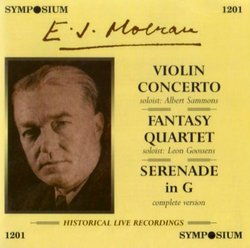| All Artists: E.J. Moeran, Spoken Word, Adrian Boult, Basil Cameron, Carter String Trio, BBC Symphony Orchestra, London Symphony Orchestra Title: E. J. Moeran: Violin Concerto; Fantasy Quartet; Serenade in G Members Wishing: 0 Total Copies: 0 Label: Symposium Release Date: 4/20/1999 Genres: Special Interest, Classical Styles: Chamber Music, Forms & Genres, Concertos, Historical Periods, Modern, 20th, & 21st Century, Instruments, Strings, Symphonies Number of Discs: 1 SwapaCD Credits: 1 UPC: 760411201020 |
Search - E.J. Moeran, Spoken Word, Adrian Boult :: E. J. Moeran: Violin Concerto; Fantasy Quartet; Serenade in G
 | E.J. Moeran, Spoken Word, Adrian Boult E. J. Moeran: Violin Concerto; Fantasy Quartet; Serenade in G Genres: Special Interest, Classical
|
Larger Image |
CD Details |
CD ReviewsLike a Country Fiddler - Sammons in Moeran's Concerto Thomas F. Bertonneau | Oswego, NY United States | 06/01/2001 (5 out of 5 stars) "Edward John Moeran (1894-1950) - "Jack," to his friends - owed something to Frederick Delius and something again to the "Folk-Song" school of English composers, as most ably represented by Gustav Holst and Ralph Vaughan Williams. Moeran's two works of the early 1930s, "Lonely Waters" and "Whythorne's Shadow," belong in a genre with Holst's "Somerset Rhapsody" and Vaughan Williams' "Norfolk Rhapsody." Country tunes and Elizabethan part-song contribute equally to the mixture. As Moeran matured, he acquired the confidence to tackle larger forms, as evidence by the three progressively more ambitious Rhapsodies (1922, 1924, 1943). The last one is a substantial one-movement concerto for piano and orchestra. A breakthrough came with the Symphony in G-Minor (begun in 1924 but only completed in 1937) followed by the three-movement Violin Concerto (1937-41), a beautiful essay of dual English and Irish provenance, that sandwiches a rapid central movement between two slow ones. Unlike the Symphony, the Concerto did not enjoy a commercial recording in its composer's lifetime. (Barbirolli urged it to Decca, but the project failed.) In the stereo-era, however, this work has incarnated twice, once on Lyrita, with John Georgiades as soloist and Vernon Handley leading the London Symphony, and once on Chandos, with Lydia Mordkovitch as soloist and Vernon Handley again, this time leading the Ulster Orchestra. The Symposium disc gives us a 1946 BBC broadcast performance of the Violin Concerto preserved on air-check platters now released for the first time. Albert Sammons takes the solo role; he was a prominent violinist on the British scene in the middle of the century. Sir Adrian Boult leads the BBC Symphony Orchestra, playing in a Norwich locale. Just as the 1942 recording of the Symphony trumps the later entries, so too does this archival registration of the Concerto take the laurels from the competition. Not, of course, in virtue of its sound. This recording, registered off-air privately by Moeran's friend Lionel Hill, must sometimes fight through abraded surfaces, but the performance triumphs even so. Sammons reads the solo part brilliantly, finding the precise formula in the two outer movements. Frank Howes once wrote of this work that it boasts "none of the ususal rhetoric... Much of the beauty [he says] consists in the interplay of the solo violin with the separate elements of the orchestra." The whole is "gently reflective." Both Georgiades and Mordkovitch apply a tad too much muscle in the flanking slow panels; Sammons understands the requirement for a gentler, more nuanced, approach, which he delivers. In the central Rondo, on the other hand, he exercises a contrasting vigor. Sometimes he sounds like a country fiddler from County Kerry, where the composer wrote the score. Moeran believed that Sammons was "the" soloist for his Concerto, and this document makes the case. It might be a prejudice, but the older acoustic seems to fit this nostalgia-laden music better than the contemporary, in-your-ear digital sound. Symposium also gives us Moeran's Fantasy Quartet for Oboe and Strings (1947), in a performance featuring Eugene Goossens, and the Serenade in G, (1948) performed under Basil Cameron. The Serenade, like the Concerto, seems to be a privately dubbed off-air recording on acetates, which do constrict the sound in the loud passages. Never mind. It's the gutsy performance that counts. Basil Cameron was an important British conductor. He gave premières of two Bax symphonies and pioneered in the field of cinema soundtracks. (He led the studio-sessions of Arthur Bliss's music for the Wells-Korda film "Things to Come" [1936].) We should gratefully welcome this record of his more traditional concert activity. Cameron performs the complete Serenade, including an Intermezzo and a Forlane not published with the score and not heard in later recordings. Four BBC annoucements ("We will now hear..." or "We have just heard...") add to the archival character of the CD. The notes, by Mr. Hill, inform generously. All in all, Symposium gives us a worthy tribute to the least celebrated of significant mid-century British composers."
|

 Track Listings (16) - Disc #1
Track Listings (16) - Disc #1